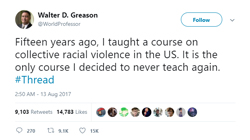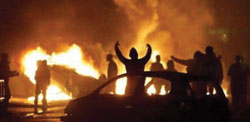The Dean of Monmouth University’s Honors School, Dr. Walter Greason, wrote a series of tweets following the protests in Charlottesville, VA on Aug. 12, that immediately went viral, attracting the attention of several news outlets.
The New York Times reports that the tragedy ensued after the white supremacist-led “Unite the Right” rally that took place in Charlottesville during the second week of August. After city officials announced that they would remove a statue of Confederate leader Robert E. Lee, white supremacists gathered and were met by counter protesters. The tensions escalated between the two groups, and one of the “Unite the Right” attendees James Alex Fields, Jr. drove his car through the counter protesters, killing one woman. Between the clashes themselves and the car attack, 34 other protesters were injured.
“[The statue] was basically a rallying point for white supremacists, the Ku Klux Klan, and neo-Confederate forces,” said Greason, “[The rally] wasn’t just about the statue, but it was about the principles of white supremacy being defended and reasserted in the United States.”
In the day following the live coverage of the violence, Greason decided to analyze the situation by explaining the underlying reasons why a horror like this would occur. He noted that many were quick to reject the “Unite the Right” movement and distance themselves from it online, and took issue with the fact that events like what happened in Charlottesville are all too common in the US.
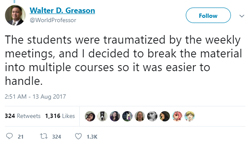 “I wrote a series of tweets… about all of the previous incidents [of racial violence],” said Greason. He drew inspiration from a class he had previously taught on the subject earlier in his professional career at Drexel University in 2001 that covered incidences of graphic violence perpetuated by white supremacists against minority Americans.
“I wrote a series of tweets… about all of the previous incidents [of racial violence],” said Greason. He drew inspiration from a class he had previously taught on the subject earlier in his professional career at Drexel University in 2001 that covered incidences of graphic violence perpetuated by white supremacists against minority Americans.
“Fifteen years ago, I taught a course on collective racial violence in the US. It is the only course I decided to never teach again,” read the first of Greason’s viral tweets.
“I had a hundred fifty thousand people check [the thread] while I was writing it… by 3 PM it was probably about four or five million,” said Greason.
He went on to detail how people interested in the course he taught began interacting with him online and discussing the material, and how his tweets were translated into seven different languages.
After a few weeks, Greason was notified that his message had reached over four billion users, making it the widest reach he’s ever had in his career.
He was also featured by NPR and Southern California Public Radio for his recent analysis.
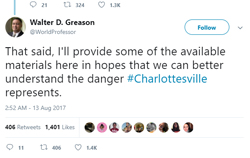 This type of coverage places Monmouth University “as a leader on the national scale,” according to Greason in the ongoing conversation about equality, opportunity, and human rights.
This type of coverage places Monmouth University “as a leader on the national scale,” according to Greason in the ongoing conversation about equality, opportunity, and human rights.
He stressed that it is everyone’s responsibility to keep this conversation going to make sure it can be as productive as possible for the future.
“As a PWI (predominantly white institution), Monmouth faculty, staff, administrators should be leading discussions about racial equality and other contemporary social issues,” said Austin Skelton, a senior political science student.
“Dr. Greason’s thread on Twitter sheds a positive light on Monmouth’s efforts towards diversity and inclusion here on campus,” Skelton said.
“Many faculty perceive that what they teach in the classroom inherently has connections to and intersections with the world outside,” said Claude Taylor, professor in the communications department.
“The idea that one would weigh in on current events and add a scholarly lens…is very consistent with what faculty do,” he continued.
Taylor’s philosophy is that part of a professor’s role in the classroom is to set a positive example of how a student should interact in civil discourse, much like what Greason did.
Greason noted that this type of phenomenon was uncommon when he first started his career in academia.
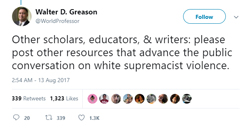 It is, in his opinion, a time of much more dire consequences for a white supremacist who will now be held accountable for his or her bigoted views and behaviors.
It is, in his opinion, a time of much more dire consequences for a white supremacist who will now be held accountable for his or her bigoted views and behaviors.
He credits a change in public opinion following an era where bigotry was almost a prerequisite for any position of power.
Taylor believes that this newfound awareness is at least in part a generational issue as millennials are “more responsive to the truth.”
This combined with the 21st century’s increased access to historical and current information allows for more understanding of historically-rooted issues, while inspiring them to tackle these issues.
“The question is then going to be ‘how are we going to approach this dialogue on our campus?’” said Taylor.
Greason’s comments may have earned national attention, but how the University’s culture responds is important as well.
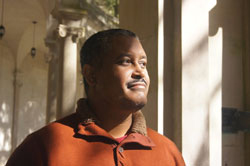 “I think there are some interesting opportunities there as a campus community to distinguish ourselves from other campuses for presenting a model for civil discourse.”
“I think there are some interesting opportunities there as a campus community to distinguish ourselves from other campuses for presenting a model for civil discourse.”
IMAGES TAKEN from Walter D. Greason’s public Twitter Feed.
PHOTO COURTESY of Walter Greason

